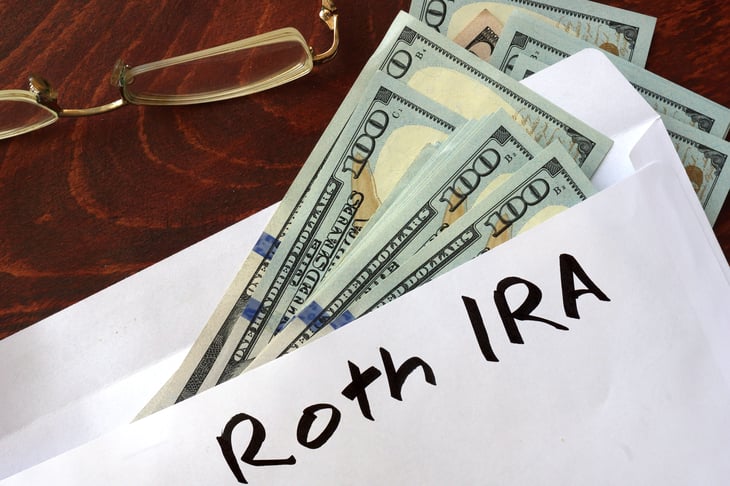
Editor's Note: This story originally appeared on NewRetirement.
Tax deferred? Tax free? Tax advantaged? It might sometimes feel a bit taxing to think about the tax implications of your retirement savings.
But, if you want to increase your estate value or reduce your taxes, then learning about Roth conversions and what they mean for your money is worthwhile.
Roth conversions can be tremendously beneficial in the right circumstances.
What Is a Roth Account? What Are Traditional Retirement Savings?

Both Roth (IRAs and 401(k)s) and traditional retirement savings accounts (IRAs and 401(k)s) are tax-advantaged. Tax-advantaged means that the account is either exempt from taxation, tax-deferred, or offers other types of tax benefits.
The main difference between a Roth account and a traditional retirement savings account is the specific tax advantages:
- Money in a traditional 401(k) or IRA grows tax deferred, meaning that you will not pay taxes on the money you save and invest into a qualified account; you are deferring that liability. However, you will pay taxes on the money later when you withdraw the funds.
- Money in a Roth account grows tax free. Contributions to this account are made with after-tax earnings (meaning you pay taxes on the money the year you earn it), but you owe zero taxes when you withdraw the funds — no matter how much the account has grown.
Roth IRAs and RMDs

Another important difference between the two kinds of accounts is that Roth IRAs do not have required minimum distributions (RMDs, money that you must withdraw starting at age 73).
Designated Roth accounts in a 401(k) or 403(b) plan are subject to the RMD rules for 2022 and 2023. However, for 2024 and later years, RMDs are no longer required from designated Roth accounts.
What Is a Roth Conversion?

A Roth conversion is when you take money that you have in a traditional 401(k) or IRA account and move it into a Roth 401(k) or IRA.
When you convert from a traditional IRA or 401(k) to a Roth IRA, you will need to pay taxes on the amount that you convert, as it was not previously taxed and it is counted as income.
However, once the conversion is complete, future growth and withdrawals from the Roth IRA are tax-free, provided that certain requirements are met.
The NewRetirement Retirement Planner enables you to model a Roth conversion to assess how the move could impact your finances, now and over your lifetime.
Within the Planner, there is also a Roth Conversion Explorer to help you determine the most advantageous time to do conversions to maximize your estate value or to minimize your lifetime tax expenditure.
5 Times When a Roth Conversion Might Be a Great Idea

Roth conversions can sometimes really save you money on taxes, but they could also cost you. It all depends on your circumstances.
While you should always consult a tax expert before doing a Roth conversion, here are five times when it will likely benefit you.
1. Higher Future Tax Rate

If you think that you will be paying higher taxes in the future, then converting to a Roth account is probably a good move. Whatever money you withdraw now will be taxed at your current rate but not at all in the future.
Tax considerations to consider might include:
- Do you intend to relocate in the future? What is the difference between your current and future state’s tax rates?
- Will you be earning a higher income in the future?
- Will money from Required Minimum Distributions (RMDs) put you in a higher tax bracket?
2. You’re Hoping to Leave Money to Heirs

In many cases, your beneficiaries will pay less in taxes if the money is in a Roth account instead of a traditional account.
If you plan to leave your retirement savings to your heirs, a Roth conversion may be a good idea. Since Roth IRA withdrawals are tax-free, your heirs won’t have to pay taxes on the money they inherit.
3. Your Savings Are Likely to Grow Significantly

Another situation when a Roth conversion could reduce taxes is when you think that the money in your retirement account will likely grow significantly.
If you do a Roth conversion before you see these big gains, then you will be paying taxes on a lower dollar amount and all growth in that account will be tax free.
4. Withdrawals Are a Long Way Off

If you are a long way off from needing to withdraw from your traditional 401(k) or IRA, then a Roth conversion may be a good idea.
Because Roth IRAs offer tax-free growth, they can be a good choice for long-term investments. If you have a long time horizon, such as 10 years or more, a Roth conversion may be a good idea.
5. You Don’t Need Money from RMDs

If you are already 73 or older, then you have already started taking RMDs.
If not, then you will be required to withdraw money from traditional 401(k)s and IRAs starting at age 73 in 2023 and age 75 in 2033 due to new RMD ages. These withdrawals can be a nuisance and can bump you into a higher tax bracket.
If you don’t need the income a RMD provides, then it might make sense to convert your traditional accounts to a Roth.
There are a lot of factors that go into Roth conversions. The above rules of thumb may be directionally useful, but it is better to calculate potential conversions in light of your overall financial situation.
Now let’s look at instances to rethink a Roth conversion.
Can You Afford the Short-Term Taxes?

When you take money out of a traditional account and convert it to a Roth account, you will owe taxes on the amount you convert. You need to be sure that you can afford this expense.
NOTE: Many people convert small amounts each year to spread out the tax burden. You do not need to convert an entire account.
You Have a Traditional 401(k) at Your Current Employer

You usually can not convert a traditional 401(k) you have with a current employer to a Roth IRA. You must wait until you have left the employer.
The Conversion Will Trigger Surcharges or Other Penalties

When you do a Roth conversion, all the money you convert from your traditional IRA or 401(k) will be taxed as income. However, it is not only the taxes that are costly; the extra income could impact other expenses:
- College costs: If you are paying for college, the income could impact financial aid packages.
- Medicare: If you are 65 or older, the more money you earn (including withdrawals from IRAs and 401(k)s taxed as income), the more you might need to pay for Medicare.
- ACA: The rates you pay for health insurance purchased from the Affordable Care Act (ACA) are determined by your income. So, you may want to forgo conversions if it will impact your insurance costs.
You Withdraw the Funds Instead of Converting

If you withdraw money from a tax-advantaged account before you are 59 1/2, then you will usually have to pay a 10% penalty in addition to the income taxes you owe.
This does not mean that you can’t convert the money, you just need to do the right kind of paperwork to transfer your funds from a traditional account to a Roth account.
The process usually involves you opening a Roth account and then asking the institution where the account is held to do the paperwork involved with the conversion.





Add a Comment
Our Policy: We welcome relevant and respectful comments in order to foster healthy and informative discussions. All other comments may be removed. Comments with links are automatically held for moderation.